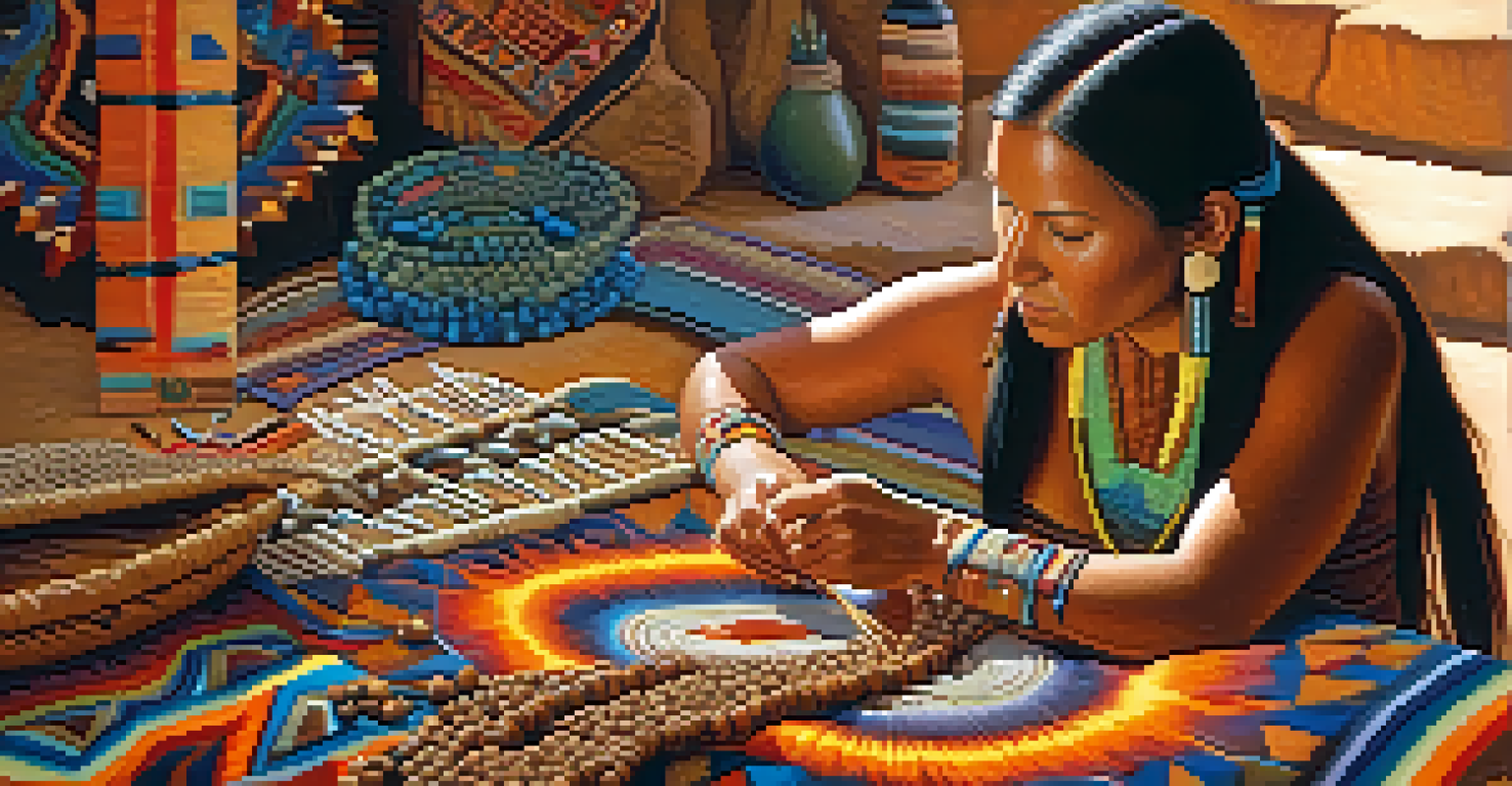Cultural Appropriation in Entheogen Studies and Practices

Understanding Cultural Appropriation in Context
Cultural appropriation refers to the adoption of elements from one culture by members of another, often without permission or understanding. In the realm of entheogens—substances used for spiritual or therapeutic purposes—this becomes particularly complex. Many cultures have deep-rooted traditions surrounding these substances, and when outsiders engage without respect or knowledge, it can lead to a dilution of their significance.
Cultural appropriation is about taking something from a culture without permission and without understanding its significance.
For example, the use of peyote by non-Indigenous individuals often raises eyebrows. While some may argue for its therapeutic benefits, it’s essential to recognize the sacred role peyote plays in Native American spiritual practices. This highlights the fine line between appreciation and appropriation, stressing the need for genuine engagement with the culture from which these practices stem.
Understanding cultural appropriation in this context isn’t just about identifying what’s wrong; it's about fostering respect and appreciation. By approaching entheogen studies with a mindset that prioritizes cultural sensitivity, we can honor the traditions that have existed for centuries and ensure that they are not commodified or misrepresented.
The Role of Indigenous Practices in Entheogen Use
Indigenous communities have long utilized entheogens as part of their spiritual and healing practices. These practices are often steeped in rich cultural narratives, rituals, and community traditions that have been passed down through generations. When these substances are used outside of their traditional context, it risks erasing the very meaning they hold for these communities.

Consider the rituals surrounding ayahuasca in the Amazon. For many Indigenous tribes, the ayahuasca ceremony is a sacred event that connects participants to their ancestors and the spirit world. When outsiders participate in these ceremonies without understanding their significance, it can feel like a violation to those who hold them dear.
Cultural Appropriation Awareness
Understanding cultural appropriation, especially regarding entheogens, is essential to foster respect and appreciation for Indigenous traditions.
Recognizing the essential role of Indigenous practices in entheogen use is vital. It invites a conversation about how modern society can benefit from these traditions without overshadowing or exploiting them. This balance is crucial for ensuring that both the spiritual and cultural integrity of these practices is maintained.
The Impact of Commercialization on Entheogen Practices
With the rising popularity of entheogens, particularly in wellness and therapeutic circles, commercialization poses a significant threat. Many entrepreneurs are eager to capitalize on the growing interest, often stripping away the cultural context and significance of these substances. This commercialization can lead to a 'fast-food' approach to spirituality, where the depth of experience is sacrificed for convenience.
The greatest gift you can give someone is your time and attention; it shows you value their story and their culture.
For instance, the proliferation of ayahuasca retreats marketed to tourists often overlooks the nuances of the ceremonial process. These retreats may offer a one-size-fits-all experience that doesn't respect the original cultural practices, further perpetuating cultural appropriation. This commodification can create a disconnect, where the spiritual journey becomes a product rather than a profound personal experience.
To combat these trends, it's essential to advocate for ethical practices in the entheogen space. Supporting businesses that prioritize cultural sensitivity and community involvement can help preserve the integrity of these traditions while allowing individuals to engage with them respectfully.
The Importance of Cultural Sensitivity in Research
As interest in entheogens grows, so does the need for culturally sensitive research practices. Researchers must approach these subjects with a deep respect for the cultures involved, striving to include Indigenous voices in their studies. This not only enriches the research but also ensures that the findings are accurate and respectful of their origins.
For example, studies on psilocybin could benefit from insights shared by Indigenous peoples who have used mushrooms for generations. Their experiences and traditional knowledge can provide invaluable context that enhances scientific understanding while honoring the roots of the practice. Without such inclusivity, research runs the risk of perpetuating colonial attitudes.
Respect Indigenous Practices
Engaging with Indigenous communities and their practices encourages a deeper understanding and respects the cultural significance of entheogens.
Cultural sensitivity in research is about building partnerships rather than extracting information. By collaborating with Indigenous communities, researchers can create a more holistic understanding of entheogens that respects their cultural significance and promotes ethical practices.
Engaging with Indigenous Communities Respectfully
One of the most effective ways to avoid cultural appropriation in entheogen practices is to engage directly with Indigenous communities. This means listening to their stories, understanding their practices, and respecting their boundaries. Building relationships based on trust and mutual respect can lead to a more authentic understanding of entheogens and their significance.
For instance, attending workshops led by Indigenous facilitators can provide insights that are often overlooked in mainstream discussions. These experiences foster a deeper appreciation for the cultural contexts of entheogens and help participants navigate their own relationships with these substances more thoughtfully. It’s about creating a dialogue, rather than imposing one’s own narrative.
Engaging with Indigenous communities also opens up opportunities for collaborative learning. This partnership can lead to more inclusive practices in entheogen studies, where the knowledge of Indigenous peoples is valued and integrated into broader discussions, ultimately enriching the conversation around these powerful substances.
Legal and Ethical Considerations in Entheogen Use
Legal frameworks surrounding entheogens are continually evolving, yet they often fail to account for the cultural significance these substances hold. Many jurisdictions focus primarily on the potential for abuse or harm, overlooking the rich history and spiritual use of these substances in Indigenous cultures. This lack of understanding can lead to further marginalization of these practices.
Ethically, it’s crucial to advocate for policies that respect Indigenous rights and acknowledge their historical relationship with entheogens. Supporting movements that seek to decriminalize the use of entheogens within cultural contexts can contribute to a more just approach. This includes recognizing the need for informed consent and cultural education in any entheogen-related initiatives.
Ethical Considerations Matter
Navigating the legal and ethical landscape surrounding entheogens requires acknowledging Indigenous rights and cultural contexts.
Navigating the legal and ethical landscape requires a nuanced approach that respects both the law and the cultural significance of these practices. By prioritizing Indigenous voices in these discussions, we can work towards frameworks that honor and protect the intricate relationship between culture and entheogen use.
Future Directions for Ethical Entheogen Practices
Looking ahead, the conversation around entheogens and cultural appropriation needs to evolve. As more people seek to incorporate these substances into their lives, there’s a growing responsibility to ensure that these practices are carried out ethically and respectfully. This involves continuous education and awareness about the cultural contexts surrounding entheogens.
One promising direction is the establishment of guidelines and best practices for engaging with entheogens that prioritize cultural sensitivity and respect. These guidelines can serve as a roadmap for both individuals and organizations, helping them navigate the complexities of entheogen use in a way that honors Indigenous traditions.

Ultimately, the future of entheogen practices should be rooted in collaboration and respect. By recognizing the importance of cultural heritage and working alongside Indigenous communities, we can create a more inclusive and respectful framework for the exploration of these powerful substances.